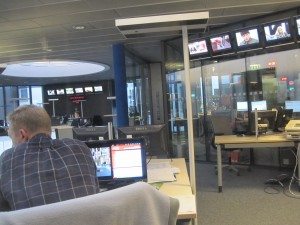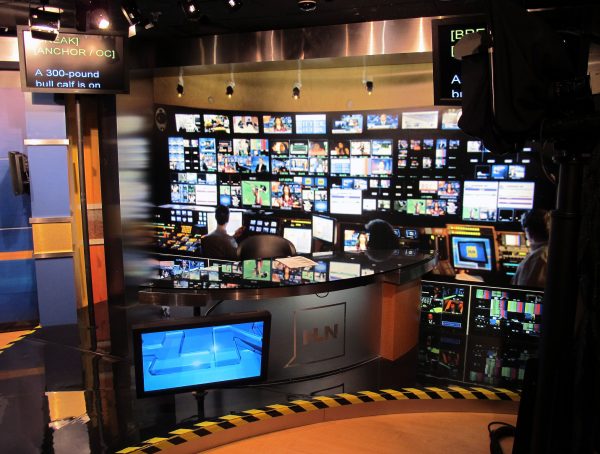 Never having to worry about where the money comes from. Giving little thought to the ratings. Paying zero attention to the Web. That’s the reality of public radio in Germany, where funding comes from taxes and ratings roll in just twice a year.
Never having to worry about where the money comes from. Giving little thought to the ratings. Paying zero attention to the Web. That’s the reality of public radio in Germany, where funding comes from taxes and ratings roll in just twice a year.
Inforadio, the all-news public radio station in Berlin and neighboring Brandenburg state, went on the air in 1995. It’s one of six local radio stations in the German capital that belong to the public broadcasting behemoth, ARD. I visited the station with a group of US broadcast journalists who are here in Germany thanks to the RIAS Berlin Commission Fellowships in cooperation with RTNDF.
Well, “visited” may not be entirely accurate. We met in a sterile conference room and merely peeked into the quiet-as-a-tomb newsroom on our way by. We weren’t allowed to walk through it because, we were told, it might disturb the staff. Let’s just say it was about as unlike any US newsroom as you could imagine–no scanners squawking, no shouting, no palpable sense of tension over upcoming deadlines. It felt more like a news cathedral than a command center.
Inforadio employs about 120 journalists, including part-timers. Salaries are higher than in commercial radio and jobs are secure. The budget for part-timers alone is 3 million Euros (about $4.5 million) a year. It’s the most popular news radio in Germany with a 5 percent share of the audience and news director Marion Brandau says, “We are content.”
The program structure may look familiar–five minutes of news every 20 minutes, with weather, traffic and sports, plus long-form interviews and background reports. But don’t confuse Inforadio with All Things Considered. One major difference: the program has four rotating hosts who are on the air only one week per month. Why? “Because it’s exhausting,” says Brandau.
Host Alexander Krahe says it’s a lot of work, getting up at 3 in the morning to anchor the show and staying late to do interviews for the next day’s program. He doesn’t want to work 24 hours a day, and besides, he says, “I need time to recreate.” During the weeks he doesn’t anchor, Krahe serves as editor-in-chief for the program.
Reporters at Inforadio typically cover just one story a day. And they’re not being pushed to file separate versions for the Web. In fact, the station is prohibited from putting anything much online that hasn’t already aired. Privately owned news organizations, trying to make money on the Web, have successfully argued that online competition from publicly funded broadcasters would be unfair.
The station gets ratings from listener surveys, not meters. The audience is mostly male. The average age: 52. But there’s no apparent concern about the demographics or the future.
A similar confidence–or was it arrogance?–came through at another public radio station we visited earlier in the week. DK, which broadcasts nationally, also has an older audience. Young people aren’t listening to the radio here any more than they do in the US. But no worries, said one of the journalists. When they turn 35, they’ll get interested in news and start listening.
Maybe he’s right, but maybe it just doesn’t matter if anyone listens. Funding for public broadcasting comes from a tax of 18 Euros per month per German household; it’s now a robust 8-10 billion Euros a year. Nobody’s talking about budget cuts. For now, public broadcasting–radio and television–split the audience almost evenly with commercial stations. There’s no obvious pressure for change even if the ratings slip. Talk about a different world.
Eat your heart out, NPR.








